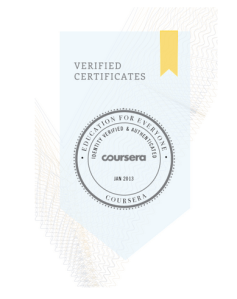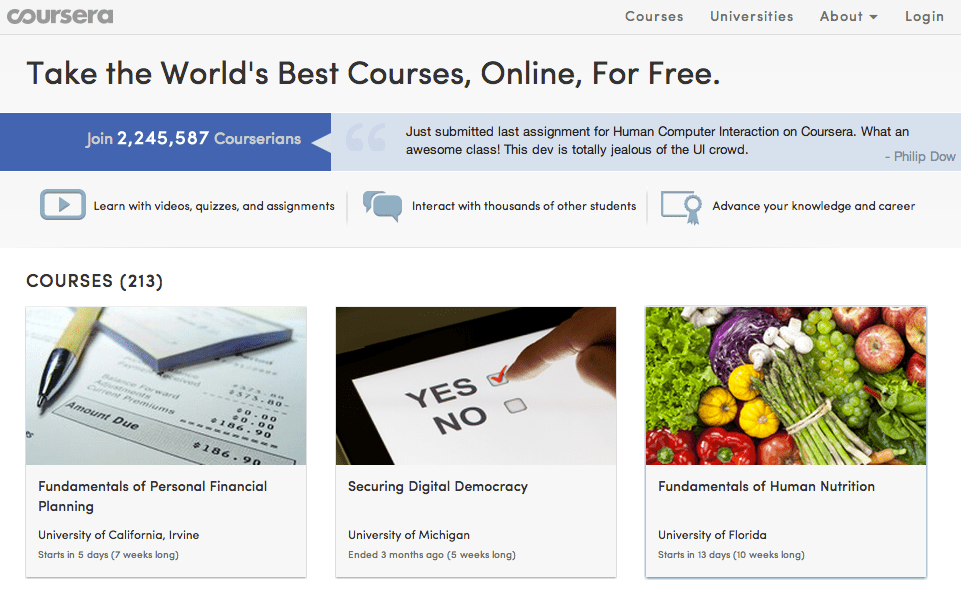Stanford professors Daphne Koller and Andrew Ng launched Coursera last year to give anyone and everyone access to courses from top-tier universities — for free, online. At launch, the startup offered courses from a mere three institutions, but today, things have changed, as Coursera’s platform now hosts over 200 courses from 33 top international and domestic schools and reaches over 2 million students around the globe.
It has the makings of a transformational concept, offering content only from the most reputed departments, professors and universities, bringing that experience online and giving the key to the masses. Yet, in spite of a mission that’s easy to get behind, Coursera hasn’t been without its detractors. While massive open online courses (a.k.a. “MOOCs”) were one of the most-talked-about subjects in education in 2012, many believe they are just a flash in the pan — that the growing adoption of MOOCs among universities is the result of peer pressure, an indication that institutions will take any action that might be perceived as “going digital,” regardless of value.
Furthermore, if the proposed goal of this new form of virtual education is actually to create a viable online education model (not just a poor alternative), schools want to see some sort of ROI, for free, open courses to mean something and be able to apply the same admissions process they use for on-campus programs. In turn, while MOOCs are great for distance learning and for those pursuing continuing education, most platforms aren’t credit-bearing. In other words, they don’t offer diplomas.
The other issue: Beyond the fact that Coursera has raised $22 million in venture capital (the same is true of Udacity), MOOC platforms haven’t yet been able to create substantive business models. Perhaps unfair for Coursera, being less than a year from launch, but an oft-voiced concern nonetheless.
Meanwhile, beyond Udacity and edX, startups like the open LMS platform, Instructure, and online degree program specialist, 2U, have made legitimate strides into the MOOC space, offering a blend of free, MOOC-style and for-credit courses. Both have partnered with top-tier universities, offer quality content and tech and have succeeded in setting the table for supplementary revenue streams. (“Supplementary” because both created their course networks as extensions of their original businesses — something Coursera doesn’t have the luxury of doing.)
That’s also liberating to a degree, as Coursera can be more nimble without having to worry about supporting an LMS or online graduate programs. Nonetheless, the startup has quietly been positioning itself to take advantage of its exponential early growth and move towards revenue-generation, beginning in December with the launch of Career Services. Essentially, Coursera’s new service is an opt-in to a recruiting program that allows students to find and connect with positions that “match their skills and interests.”
 Using “sophisticated analytics,” Coursera looks for matches between students and companies. Once it identifies a match, it sends an email to students, seeking their approval, only making an intro if the student gives them the go-ahead. Companies pay Coursera a flat fee for each introduction, with a share of that revenue going to the colleges offering the course. Moving into recruiting and career services is a natural extension, but it can be a difficult thing to do well (and create real value), especially without stirring up privacy concerns. That being said, Udacity has also begun employing a similar model and has started to make money doing it.
Using “sophisticated analytics,” Coursera looks for matches between students and companies. Once it identifies a match, it sends an email to students, seeking their approval, only making an intro if the student gives them the go-ahead. Companies pay Coursera a flat fee for each introduction, with a share of that revenue going to the colleges offering the course. Moving into recruiting and career services is a natural extension, but it can be a difficult thing to do well (and create real value), especially without stirring up privacy concerns. That being said, Udacity has also begun employing a similar model and has started to make money doing it.
Nonetheless, Coursera today unveiled its next phase and what will likely be its most significant source of revenue: Verified certificates. Students who take a course on its platform will now be able to earn “Verified Certificates” for a small fee. The new option, called Signature Track, is available on a course-by-course basis and is designed to provide verification for the work students complete on its platform, giving value to that work in the form of the startup’s first foray into credentialing. The certificate, however does not include credit toward a degree program, it simply aims to give them a more meaningful way to prove that they’ve completed the course.
At launch, the startup is piloting its certificates with five courses and eventually plans to offer Signature Tracks for the majority of its courses. Students will have up to three weeks from the beginning of the course to sign up for a Signature Track. If they participate, they take two photos with their webcam, one of themselves, the other of a photo ID and create a “biometric profile of their unique typing patterns by typing a short phrase.” When submitting work for a course, they type the same phrase to match the record to their ID. Upon completion, students receive a certificate issued by the university and Coursera, which they’ll be able to share with anyone they choose via their “personal Course Records” page on Coursera.
The price of admission into Signature track depends on the course, but will range from $30 to $100, and students who cannot afford the fee will be able to register for financial assistance.
All in all, it’s not exactly a fool-proof way of ensuring the identity of the person taking the course, but it’s a great start. And, while Verified Certificates don’t count towards a degree, the startup recently entered into an agreement with the American Council on Education (ACE) to evaluate a certain subset of courses on the platform to see if they will be able to qualify for credits towards their degree. There’s no word yet on when it will be approved, but it’s not far off. And once it is, it makes Coursera courses (and Signature Track) a whole lot more valuable. Especially considering, for the immediate future, the startup plans to continue offering all of its courses for free.
It’s still early to say what this can mean for Coursera, especially as Duke, UCSF, Illinois and Georgia Tech are the only schools that have agreed to participate in the certificate program thus far, but the potential seems huge. For $30, there’s not a lot of friction standing in the way of opting in, though, again, a certificate means little next to a degree. If Coursera begins offering accredited courses and if it’s able to keep prices low, expect people to come running. Those are two big “ifs” and there’s a big tug-and-pull ahead, but the implications are exciting.































Comment